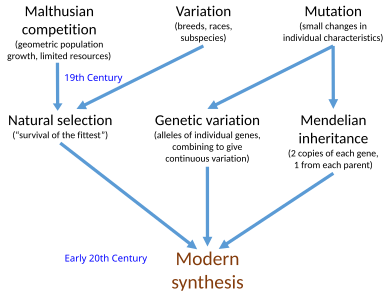
Back اصطناع تطوري حديث Arabic Синтетична теория за еволюцията Bulgarian আধুনিক বিবর্তনিক সংশ্লেষণ Bengali/Bangla Moderna evolucijska sinteza BS Síntesi evolutiva moderna Catalan Moderní evoluční syntéza Czech Synthetische Evolutionstheorie German Síntesis evolutiva moderna Spanish Sünteetiline evolutsiooniteooria Estonian Eboluzioaren teoria sintetikoa Basque

The modern synthesis[a] was the early 20th-century synthesis of Charles Darwin's theory of evolution and Gregor Mendel's ideas on heredity into a joint mathematical framework. Julian Huxley coined the term in his 1942 book, Evolution: The Modern Synthesis. The synthesis combined the ideas of natural selection, Mendelian genetics, and population genetics. It also related the broad-scale macroevolution seen by palaeontologists to the small-scale microevolution of local populations.
The synthesis was defined differently by its founders, with Ernst Mayr in 1959, G. Ledyard Stebbins in 1966, and Theodosius Dobzhansky in 1974 offering differing basic postulates, though they all include natural selection, working on heritable variation supplied by mutation. Other major figures in the synthesis included E. B. Ford, Bernhard Rensch, Ivan Schmalhausen, and George Gaylord Simpson. An early event in the modern synthesis was R. A. Fisher's 1918 paper on mathematical population genetics, though William Bateson, and separately Udny Yule, had already started to show how Mendelian genetics could work in evolution in 1902.
Different syntheses followed, including with social behaviour in E. O. Wilson's sociobiology in 1975, evolutionary developmental biology's integration of embryology with genetics and evolution, starting in 1977, and Massimo Pigliucci's and Gerd B. Müller's proposed extended evolutionary synthesis of 2007. In the view of evolutionary biologist Eugene Koonin in 2009, the modern synthesis will be replaced by a 'post-modern' synthesis that will include revolutionary changes in molecular biology, the study of prokaryotes and the resulting tree of life, and genomics.[3]
- ^ Gould 2002, p. 216
- ^ Huxley 2010.
- ^ Cite error: The named reference
Koonin2009was invoked but never defined (see the help page).
Cite error: There are <ref group=lower-alpha> tags or {{efn}} templates on this page, but the references will not show without a {{reflist|group=lower-alpha}} template or {{notelist}} template (see the help page).